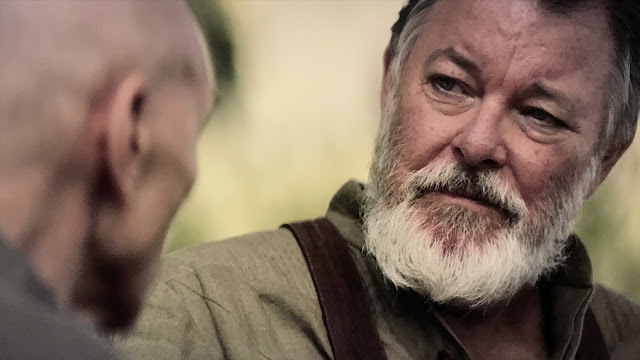Jean-Luc Picard to Will Riker in “Nepenthe”
The seventh episode of “Star Trek: Picard” (titled “Nepenthe”) manages to nurse the first season back to a healthy path.
Sometimes a dose of familiar faces from the past is the best remedy in these situations.
This episode sees Picard (Patrick Stewart) and Soji (Isa Briones) transporting to the planet of Nepenthe — the current residence of William Riker (Jonathan Frakes) and Deanna Troi (Marina Sirtis). The two characters tied the knot in the 2002 film “Star Trek: Nemesis” and were part of Picard’s venerable crew on the U.S.S. Enterprise.
Riker and Troi have a precocious pre-teen daughter named Kestra (Lulu Wilson). She greets Picard and Soji as they are traversing the wilderness toward the family home. She is wearing a tribal-looking costume and is brandishing a bow and arrow when she surprises the pair as they beam in.
Bridget commented on how much she liked the Kestra character as the episode progressed.
I also liked the character and thought the entire family dynamic was nice. I think their interaction benefits from how well drawn Riker and Troi were in “Star Trek: The Next Generation.”
Their presence is (in my opinion) why this episode is so successful. Honorable characters, well drawn, are so much more interesting than edgy characters who are merely there to serve the plot.
All too often, edgy becomes synonymous with “compelling drama” in the 21st century (or the 24th century, for that matter).
Part of the reason I’ve shifted back-and-forth with my feelings regarding “Star Trek: Picard” is that the “textured” nature of the new characters sometimes feels overly manufactured — a plot device designed to appeal to modern tastes.
While I understand the desire to stay on par with your contemporaries, I also know that “Star Trek” hasn’t enjoyed popularity over 50-plus years for following the herd.
In addition to the storyline involving Riker’s brood, we learn that Romulan warrior Elnor did indeed survive recent events on the Artifact (which took place at the end of the sixth episode).
We also learn more about Dr. Jurati’s (Alison Pill) conversation with Commodore Oh (Tamlyn Tomita) at the Daystrom Institute (which was teased in the third episode).
Despite the fact that those threads were also going on, the core of the “Nepenthe” episode was Picard and Soji’s interactions with Troi, Riker, and Kestra.
There’s something oddly comforting about watching William Riker make wood-fired pizza (topped with Antarean basil, fresh tomatoes, and bunnicorn sausage) in an outdoor oven.
“Soji,” says Riker as he is serving the pizza for dinner. “Welcome to our home. Guests get two (slices).”
Riker and Troi planted roots on Nepenthe because their late son Thad was suffering from a silicone-based ailment, and the soil on the planet was known for its regenerative properties.
(We also learn that an “active positronic matrix” could have helped cure the disease, but due to the ban on synthetic life, there wasn’t one available. This tidbit in the script felt a tad bit forced and convenient under the circumstances, but I’ll let it pass in this instance.)
It was neat to see the family living a rural life away from the futuristic cacophony of starships and uniform jumpsuits. I particularly liked how their son had a creative bent during his life and developed numerous pretend languages (among them, Viveen) and a fantasy home world (Ardani).
To be honest, I would watch a show called “Star Trek: Riker.” Think about how interesting a series could have been where Riker & Co. scoured the galaxy looking for an android to help cure his son’s life-threatening illness.
Bridget agreed. She mused: “Why couldn’t the show have been this from the beginning?”
Why, indeed.
Obviously, the side trip to Nepenthe was a moment of fan service, but it was a worthwhile one. It reminds you that the success of TNG was built on the “ensemble chemistry” the cast developed over seven seasons.
It also reminds you that few new characters on “Picard” (other than Soji and Dahj Asha) are particularly compelling at this point in the show’s development.
If nothing else, the episode illustrates that the kinder and gentler elements “Star Trek” has embued for decades can still make for compelling drama in the year 2020.
==============================










No comments:
Post a Comment